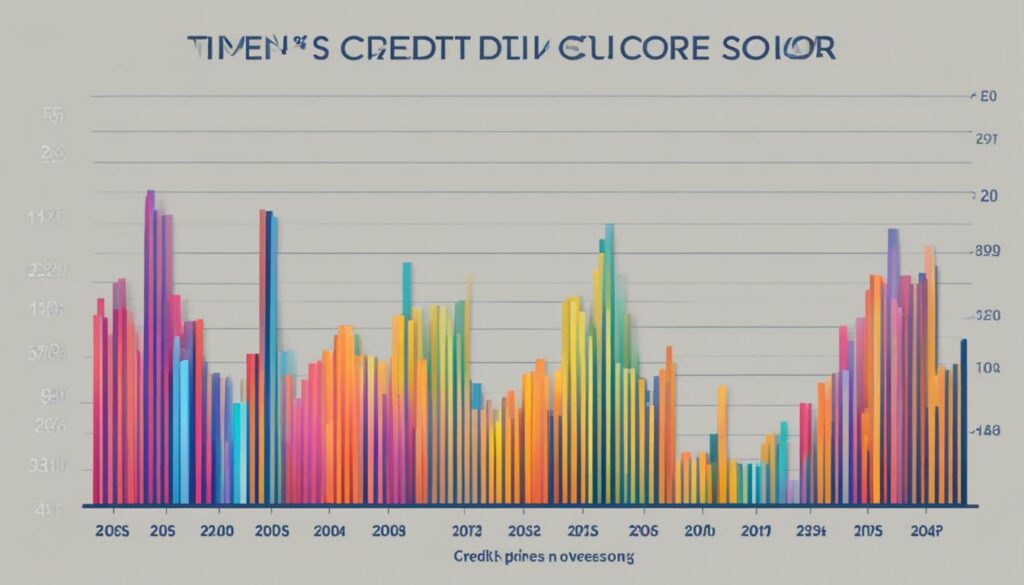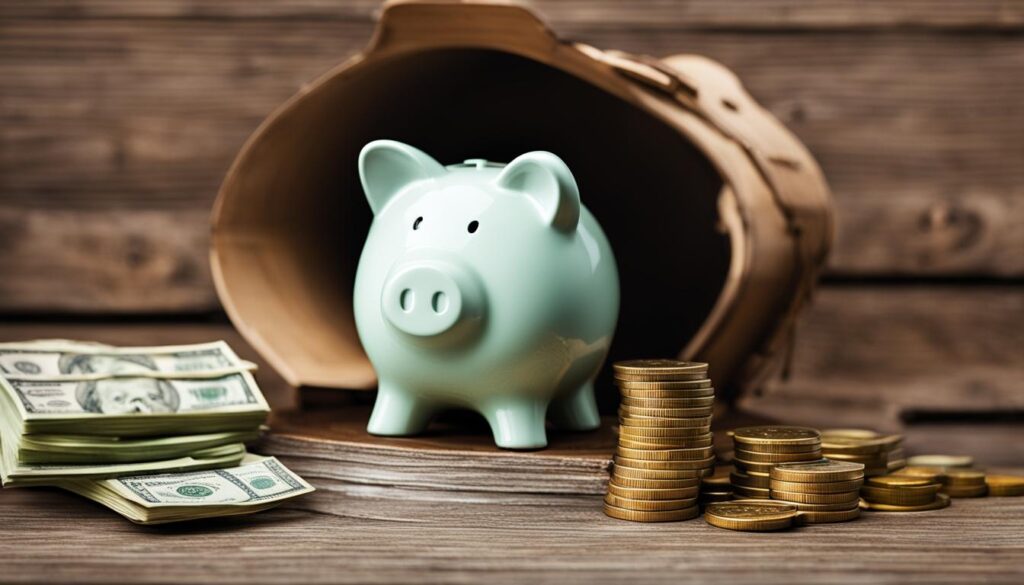Making smart financial choices in your 20s can set you up for long-term success. It’s a crucial time to learn budgeting, saving, and growing your money to achieve financial milestones. By taking proactive steps now, you can pave the way for a stable financial future.
Creating a budget is the first step toward financial success in your 20s. It allows you to track your income and expenses, ensuring you don’t overspend and live within your means. Building a good credit score, setting up an emergency fund, and saving for retirement are also key milestones to strive for during this period.
Key Takeaways:
- Create a budget to track your income and expenses.
- Build a good credit score to secure future financial opportunities.
- Set up an emergency fund to handle unexpected expenses.
- Start saving for retirement early to capitalize on compound interest.
- Develop good money habits to sustain long-term financial success.
Create a Budget and Stick to It
Creating a budget is an essential step in managing your finances in your 20s. It allows you to track your income and expenses, helping you avoid overspending and ensuring that you stay within your means. By creating a budget, you gain a clear understanding of where your money is going and can make adjustments to align your spending habits with your financial goals.
There are several online resources and apps available that can assist you in creating and managing your budget. These tools can help you track your expenses, categorize your spending, and provide insights into your financial habits. Some popular budgeting apps include Mint, YNAB (You Need a Budget), and Personal Capital. Explore these options to find the one that suits your needs and preferences.
Quote: “A budget is telling your money where to go instead of wondering where it went.” – Dave Ramsey
Regularly reviewing your budget is crucial for financial success, especially when your income or spending habits change. Make it a habit to check in with your budgeting goals and make any necessary adjustments. If, for example, you receive a raise or experience an income decrease, update your budget accordingly to ensure that it remains reflective of your financial situation.
| Benefits of Creating and Sticking to a Budget | Practical Tips for Budgeting |
|---|---|
|
|
Creating a budget and sticking to it requires discipline and commitment. However, the benefits of having a clear financial plan are well worth the effort. Take control of your finances and start building a solid foundation for your 20s and beyond.
Build a Good Credit Score
Establishing a good credit score in your 20s is crucial for future financial success. A credit score is a numerical representation of your creditworthiness and is used by lenders to determine whether to approve you for credit or loans. Having a good credit score can make it easier to qualify for lower interest rates and better loan terms in the future.
One way to start building your credit is by becoming an authorized user on a family member or friend’s credit card. This allows you to piggyback off their positive credit history and can help boost your own credit score. However, it’s important to choose someone who has a good credit track record and practices responsible credit habits.
Another option to consider is applying for a secured credit card. A secured card requires a deposit that serves as collateral for your credit limit. This can be a useful tool for building credit if you’re unable to qualify for a traditional credit card. By using a secured card responsibly and making timely payments, you can demonstrate responsible credit behavior and improve your credit score over time.
| Credit Building Strategies | Pros | Cons |
|---|---|---|
| Becoming an authorized user | Can benefit from existing positive credit history | Dependency on the primary cardholder’s responsible credit behavior |
| Applying for a secured card | Allows you to establish credit even with no credit history | Requires a deposit and may have higher fees and interest rates |
In addition to these options, there are also credit building tools like Experian Boost that can help raise your credit score without a credit card. Experian Boost allows you to include positive payment history for bills like utilities and streaming services in your credit report, potentially boosting your score.
To maintain a good credit score, it’s important to use credit responsibly. This includes keeping your credit card utilization low (aim for under 30% of your credit limit), making all payments on time, and avoiding excessive debt. By staying proactive and practicing good credit habits, you can build a solid credit foundation in your 20s and set yourself up for financial success in the future.

Building Credit Score Tips
- Pay all bills, including credit card bills, on time
- Keep your credit card balances low
- Avoid applying for multiple credit cards or loans within a short period
- Regularly check your credit report for errors or discrepancies
- Avoid closing old credit card accounts
Set Up an Emergency Fund
Establishing an emergency fund is a crucial step in securing your financial future, especially in uncertain times like the coronavirus pandemic and high unemployment rates. An emergency fund provides a safety net to cover unexpected expenses and prevents you from relying on loans or credit cards. Experts recommend keeping three to six months’ worth of expenses in your emergency fund, but saving as much as you can afford is always a good strategy.
One effective way to maximize your emergency fund is by opening a high-yield savings account. These accounts offer higher interest rates compared to traditional savings accounts, allowing your money to grow faster over time. By choosing a high-yield savings account, you can make the most of your savings and increase the funds available for any unforeseen circumstances.
In order to reach your savings goals, it’s important to establish saving strategies. Make it a habit to set aside a portion of your income specifically for your emergency fund. You can automate your savings by setting up automatic transfers from your checking account to your high-yield savings account each month. This ensures that you consistently contribute to your emergency fund without even thinking about it.
Remember, the purpose of an emergency fund is to have readily accessible funds in case of an unforeseen event. It’s essential to resist the temptation to dip into your emergency fund for non-emergency expenses. By prioritizing your financial well-being and making smart saving choices, you’ll be better equipped to handle any unexpected situations that may arise.

The Importance of Establishing an Emergency Fund
“An emergency fund provides financial security and peace of mind. It’s like having a safety net that protects you from falling into debt during unexpected situations. By setting up an emergency fund, you are taking a proactive step towards securing your financial future.”
-Financial Expert
Table: Benefits of a High-Yield Savings Account
| Benefits | Description |
|---|---|
| Higher Interest Rates | High-yield savings accounts offer better interest rates compared to traditional savings accounts, allowing your money to grow faster. |
| Liquidity | High-yield savings accounts provide easy access to your funds whenever you need them. |
| FDIC Insurance | High-yield savings accounts are typically backed by the Federal Deposit Insurance Corporation (FDIC), providing protection for your deposited funds. |
| No Minimum Balance Requirements | Many high-yield savings accounts do not require a minimum balance, making it accessible to individuals with varying income levels. |
By setting up an emergency fund and utilizing a high-yield savings account, you can build financial resilience and be well-prepared for any unexpected expenses that may come your way.
Start Saving for Retirement
One of the most important financial goals to prioritize in your 20s is saving for retirement. Although it may seem far off, starting early can significantly impact your financial future. By taking advantage of employer-sponsored retirement accounts like a 401(k) and opening a Roth IRA, you can set yourself up for long-term financial security.
Employer-sponsored retirement accounts, such as a 401(k), are a powerful tool for retirement savings. If your employer offers a 401(k) plan, make sure to contribute to it, especially if there is an employer match. The money you contribute is tax-deferred, meaning it is taken out of your paycheck before taxes are deducted. This lowers your taxable income and allows your savings to grow tax-free until retirement. Taking advantage of employer matches helps boost your savings even more.
If your employer does not offer a 401(k) or you want to supplement your savings, consider opening a Roth IRA. Unlike a 401(k), contributions to a Roth IRA are made with after-tax dollars. However, the money grows tax-free, and qualified withdrawals in retirement are tax-free as well. This can provide tax advantages in the long run, especially if you anticipate your tax rate to be higher in retirement.
The power of compound interest is another reason to start saving for retirement as early as possible. Compound interest is the ability of your savings to earn interest on the interest that has already been earned. Over time, this can lead to significant growth in your retirement savings. By starting in your 20s, you have more time for your savings to compound, giving you a greater potential for long-term financial success.

| 401(k) | Roth IRA |
|---|---|
| Contributions are tax-deferred | Contributions are made with after-tax dollars |
| Employer match may be available | No employer match |
| Withdrawals in retirement are taxed | Qualified withdrawals are tax-free |
| No income limits for contributions | Income limits for contributions |
Benefits of Saving for Retirement
- Financial security in retirement
- Tax advantages, depending on the account type
- Compound interest growth over time
- Opportunity to take advantage of employer matches
- Flexibility and control over your savings
Starting early and making regular contributions to retirement accounts can lead to a comfortable retirement. Take advantage of employer-sponsored accounts and consider opening a Roth IRA to maximize your savings potential.
Conclusion
Making smart financial decisions in your 20s is crucial for long-term financial success. By managing your money effectively, you can achieve your financial milestones and goals.
Creating a budget and sticking to it is essential for tracking your expenses and ensuring you don’t spend more than you can afford. Building a good credit score opens up opportunities for future financial endeavors, like getting a mortgage or a loan.
Setting up an emergency fund provides a safety net during unexpected situations, such as job loss or medical emergencies. Starting to save for retirement early allows you to take advantage of compound interest and grow your savings over time.
Paying off debt and developing good money habits are also important steps to secure your financial future. By making smart financial decisions in your 20s, you can pave the way for long-term financial success and achieve your financial goals. In addition to paying off debt and developing good money habits, it’s essential to build an emergency fund that can cushion you in unexpected situations. As you navigate through your 20s, consider investing in your education and skill development, as this can significantly increase your earning potential. These foundational steps will not only help you enjoy stability in your 20s but will also set the groundwork for managing financial risks in your 30s, ensuring that you’re well-prepared for any challenges that come your way.
FAQ
What are the smart money moves to make in your 20s?
The smart money moves to make in your 20s include creating a budget and sticking to it, building a good credit score, setting up an emergency fund, saving for retirement, paying off debt, and developing good money habits. Additionally, exploring side hustles for young adults can significantly boost your income and provide extra funds for your savings goals. Whether it’s freelancing, tutoring, or starting an online business, these opportunities allow for financial growth while gaining valuable skills. By prioritizing financial literacy and diversifying your income streams, you set a strong foundation for a secure financial future.
How do I create a budget and stick to it?
To create a budget, you can use online resources and apps to track your income and expenses. Sticking to your budget involves regularly checking in with your goals and making adjustments as your income or spending habits change.
How can I build a good credit score in my 20s?
Building a good credit score in your 20s can be done by becoming an authorized user on a family member or friend’s credit card, applying for a secured card, or using options like Experian Boost. Regularly using a credit card, spending within your means, and paying bills on time can help improve your credit score.
Why is setting up an emergency fund important in my 20s?
Setting up an emergency fund helps cover unexpected expenses and prevents you from relying on loans or credit cards. It’s recommended to save three to six months of expenses in an emergency fund, especially during uncertain times like the coronavirus pandemic and high unemployment rates.
When should I start saving for retirement in my 20s?
It’s never too early to start saving for retirement in your 20s. Take advantage of employer-sponsored retirement accounts like a 401(k) if available, or consider opening a Roth IRA and making regular contributions. Starting early allows you to benefit from compound interest and grow your retirement savings over time.
What Role Does Insurance Play in Financial Planning in Your 20s?
Navigating insurance in your 20s is vital for a well-rounded financial plan. Insurance protects you from unforeseen events that can jeopardize your financial stability. Whether it’s health, auto, or renter’s insurance, having coverage ensures you won’t face crippling expenses. Start early to secure lower premiums and explore different options that align with your needs and budget. Building a solid insurance foundation sets you up for a more secure financial future.


Pingback: Fast-Track to Freedom: Achieving Financial Independence in Your 20s – Straight Fire Money